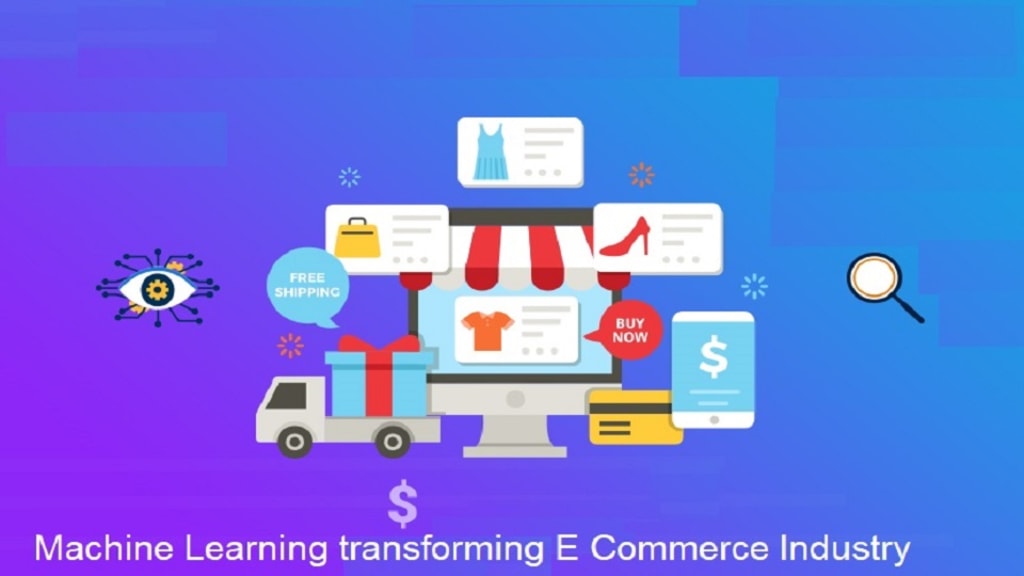10 Ways to Use Machine Learning in eCommerce
In this blog, we will explore 10 ways machine learning can be applied in eCommerce, from personalizing customer experiences to optimizing supply chain management.

Welcome to our blog on "10 Ways to Use Machine Learning in eCommerce". As eCommerce grows, companies turn to machine learning to stay ahead of their competition. Machine learning allows businesses to automate processes, analyze data, and make predictions based on that data.
Whether you're new to machine learning or already using it in your business, this blog will provide valuable insights into how it can improve your eCommerce operations. So, let's get started!
What is Machine Learning?
Machine Learning (ML) is a subset of Artificial Intelligence (AI) that allows computers to learn and improve from experience without being explicitly programmed automatically. It is the science of getting computers to act and improve their performance in a particular task by learning from data.
In machine learning, algorithms are used to learn patterns and relationships in data and then use these patterns to make predictions or decisions on new data.
It involves training a model on a dataset, testing it to evaluate its performance, and refining it to achieve better accuracy.
Reinforcement learning involves an agent learning by interacting with an environment and receiving feedback through rewards or punishments. Hire an AI Development company if you want to know more about machine leading in utilization in eCommerce.
How Machine Learning Works – AI Use Cases in eCommerce
Machine learning is a subset of artificial intelligence that allows computer systems to learn and improve from experience without being explicitly programmed.
In the context of eCommerce, machine learning can be used to analyze customer behavior, make personalized recommendations, and detect fraud.
Here's a step-by-step overview of how machine learning works:
1. Data Collection:
The first step in machine learning is collecting data. In eCommerce, this might include customer behavior, product, and sales data.
2. Data Preprocessing:
Once the data is collected, it needs to be preprocessed. It includes cleaning the data, removing errors, and transforming it into a format that machine learning algorithms can use.
3. Feature Extraction:
Next, features are extracted from the data. These are the variables that will be used to make predictions. For example, eCommerce features might include customer demographics, purchase history, and browsing behavior.
4. Model Training:
Machine learning algorithms are used to train models based on the features extracted from the data. It involves using algorithms to identify patterns in the data and make predictions based on those patterns.
5. Model Evaluation:
Once the models are trained, they must be evaluated to ensure accuracy and effectiveness. It is done by testing the model on a separate data set and comparing the predictions to the actual outcomes.
6. Model Deployment:
Once a model is evaluated and effective, it can be deployed into production. It involves integrating the model into the eCommerce system so that it can be used to make predictions in real time.
Here are some examples of how machine learning can be used in eCommerce:
1. Product Recommendations:
Machine learning can analyze customer behavior and make personalized product recommendations. It can increase customer engagement and sales.
2. Fraud Detection:
Machine learning can be used to detect fraudulent transactions by analyzing patterns in customer behavior and purchase history.
3. Inventory Management:
Machine learning can predict product demand and optimize inventory levels, reducing the risk of overstocking or under stocking.
4. Price Optimization:
Machine learning can optimize prices based on demand, competition, and other factors. It can increase sales and profitability.
5. Customer Service:
Machine learning can analyze customer feedback and sentiment, allowing eCommerce companies to improve their products and services based on customer preferences and feedback.
10 Ways to Use Machine Learning in eCommerce
Machine learning has become an essential tool in many industries, and eCommerce is no exception. With the enormous amount of data that eCommerce generates, machine learning can help online retailers to improve the customer experience, increase sales, and automate business processes.
This blog will discuss 10 ways to use machine learning in eCommerce.
1. Personalization
One of the most significant advantages of machine learning is its ability to personalize the shopping experience for customers. By analyzing customer data such as search history, purchase history, and behavior on the site, machine learning algorithms can provide product recommendations tailored to each customer. This approach can increase customer engagement and loyalty, leading to higher conversion rates.
2. Search optimization
Machine learning can help improve the eCommerce website's search function by providing more accurate and relevant results. By analyzing customer behavior and search patterns, machine learning algorithms can learn what customers seek and prioritize the most relevant products in search results. Contact the best ML development company to learn more about using machine learning in the e-commerce industry.
3. Fraud Detection
eCommerce is vulnerable to fraudulent activities like credit card fraud, identity theft, and chargebacks. Machine learning algorithms can help to identify fraudulent activities by analyzing patterns and anomalies in data.
It can help eCommerce businesses to protect themselves and their customers from financial loss.
4. Inventory Management
Machine learning algorithms can help optimize inventory management by predicting product demand. By analyzing historical sales data, current inventory levels, and external factors such as seasonality, machine learning algorithms can predict future product demand and adjust inventory levels accordingly. It can help to reduce waste, increase efficiency, and improve profitability.
5. Price optimization
Machine learning algorithms can help eCommerce businesses to optimize pricing by analyzing customer behavior, competitor pricing, and market trends.
E-commerce businesses can increase revenue and profitability by adjusting prices based on demand, supply, and other factors.
6. Customer Segmentation
Machine learning algorithms can help segment customers based on their behavior and characteristics. By analyzing customer data such as purchase history, search history, and demographics, machine learning algorithms can identify groups of customers with similar preferences and behavior.
It can help eCommerce businesses to target specific customer groups with personalized marketing campaigns and product recommendations.
7. Chatbots
Chatbots are computer programs that can simulate human conversation. Chatbots can use machine learning algorithms to provide customers with personalized support and assistance.
Chatbots can help eCommerce businesses to reduce customer support costs, improve customer satisfaction, and increase sales.
8. Image Recognition
Machine learning algorithms can help to improve image recognition on eCommerce websites. Machine learning algorithms can identify product features and attributes by analyzing product images, such as color, size, and material. It can help customers to find the products they are looking for more easily and quickly.
9. Customer Churn Prediction
Machine learning algorithms can help eCommerce businesses to predict customer churn by analyzing customer behavior and purchase history.
By identifying customers likely to churn, eCommerce businesses can take proactive measures to retain them, such as offering personalized promotions or improving the customer experience.
10. Sentiment Analysis
Machine learning algorithms can help to analyze customer sentiment by analyzing customer reviews, feedback, and social media posts. It can help eCommerce businesses to identify customer pain points and areas for improvement in the customer experience.
Takeaway!
In conclusion, machine learning has many eCommerce applications, from personalization and search optimization to fraud detection and inventory management.
Using machine learning algorithms, eCommerce businesses can improve the customer experience, increase sales, and automate business processes. Contact the best e-commerce app development company if you want to utilize machine learning in e-commerce.
About the Creator
Anurag Jain
Anurag Jain is the Senior SEO Analyst at Dev Technosy, a global ranking custom software development company.
website: https://devtechnosys.com/






Comments
There are no comments for this story
Be the first to respond and start the conversation.